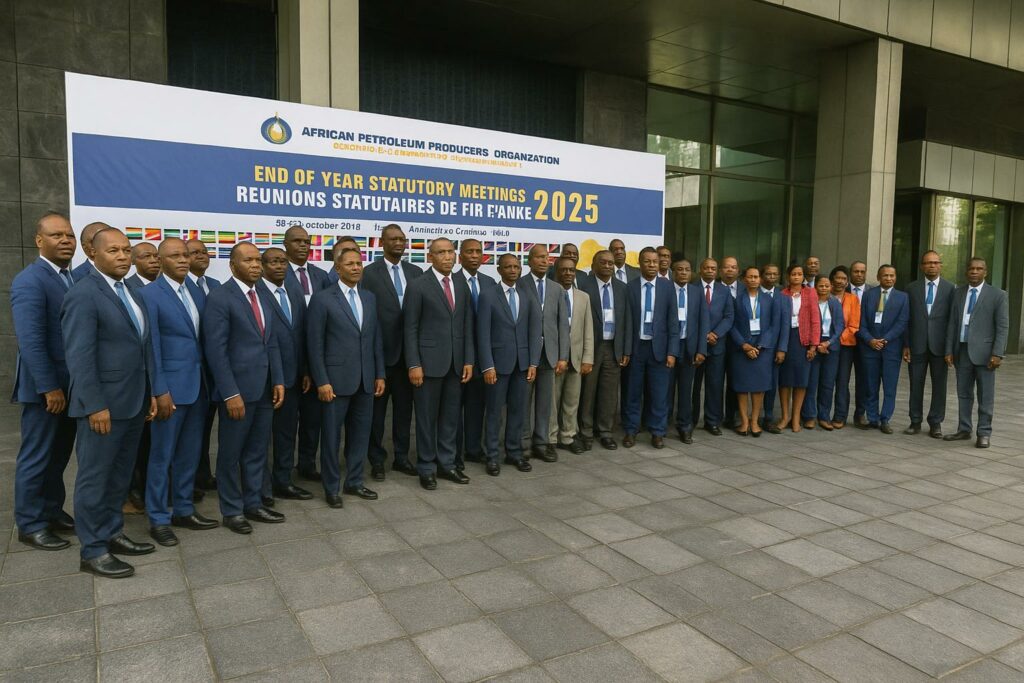Strategic Gatherings in Kintélé Reinforce Unity
From 31 October to 4 November 2025, the riverside conference centre of Kintélé became the diplomatic heart of Africa’s oil industry. The twenty-fifth statutory session of the APPO Executive Council and the forty-eighth Council of Ministers assembled delegates from the organisation’s eighteen member states, a constellation that together accounts for almost half of the continent’s proven crude reserves (APPO communiqué, 1 Nov. 2025). Presiding over the proceedings, Congolese Minister of Hydrocarbons Bruno Jean-Richard Itoua opened the deliberations by commending the “spirit of unity and professionalism” that has allowed the once-understated institution to gain strategic weight in global forums.
Bank of Energy Nears Operational Take-off
Centre stage in the Kintélé agenda was the African Energy Bank, a flagship initiative conceived in Brazzaville in 2018 to provide fit-for-purpose financing for exploration, midstream infrastructure and low-carbon technologies. According to Minister Itoua, seventy percent of the initial capital subscription—about US$350 million—has already been committed, an achievement he described as “a continental act of faith in our own resources”. Construction of the bank’s headquarters, located within Kintélé’s emerging financial district, is reported to be more than ninety percent complete, positioning the institution for a first tranche of lending before the end of the year. Regional analysts note that the facility could reduce Africa’s dependence on offshore capital at a time when many international lenders are tightening criteria for hydrocarbon projects.
Post-Pandemic Reforms Cement APPO’s Credibility
Taking the floor after the host minister, APPO Secretary-General Dr Omar Farouk Ibrahim offered a panoramic review of the organisation’s trajectory since 2020, a period overshadowed by the disruptive effects of the Covid-19 pandemic. He underlined that the secretariat has streamlined its governance architecture, restored regular data publication and secured observer status in several UN energy dialogues. “In a little over three years, APPO has moved from the periphery to the centre of the global conversation on equitable transition,” he declared, crediting the Executive Council for its “unwavering strategic guidance”. External observers such as the African Development Bank have singled out the revamped statistical bulletin as a practical tool for investors assessing regional supply fundamentals.
Shared Vision on Local Content and Energy Transition
Beyond institutional housekeeping, ministers devoted extensive discussion to the twin imperatives of local content and a just transition. Côte d’Ivoire’s representative, Executive Council President Kouamé Bienvenu Essé, urged peers to transcend national reflexes and pool technical expertise, warning that “piecemeal approaches will only prolong our dependence on imported technologies”. Delegates endorsed a roadmap that couples stricter local-content benchmarks with cross-border vocational programmes designed to raise the share of African-trained engineers in deep-water projects. Concurrently, they agreed to promote gas-to-power schemes and carbon-capture pilots as pragmatic stepping stones toward net-zero trajectories compatible with the Paris Agreement.
Brazzaville’s Diplomatic Weight Gains Further Traction
Hosting the APPO conclave has bolstered Congo-Brazzaville’s position as a consensus-builder in African energy diplomacy. President Denis Sassou Nguesso’s government has long advocated for an integrated hydrocarbon market anchored in regional infrastructure such as the still-to-be-finalised Central African pipeline spur. In Kintélé, several delegations publicly praised the logistical arrangements and the “atmosphere of collegiality” fostered by the Congolese authorities, an intangible yet valuable asset when negotiating production coordination or joint-venture frameworks. With fresh momentum behind the African Energy Bank and a reinforced secretariat, Brazzaville appears poised to convert diplomatic capital into material gains for the wider sub-region, aligning resource development with sustainable growth ambitions.

